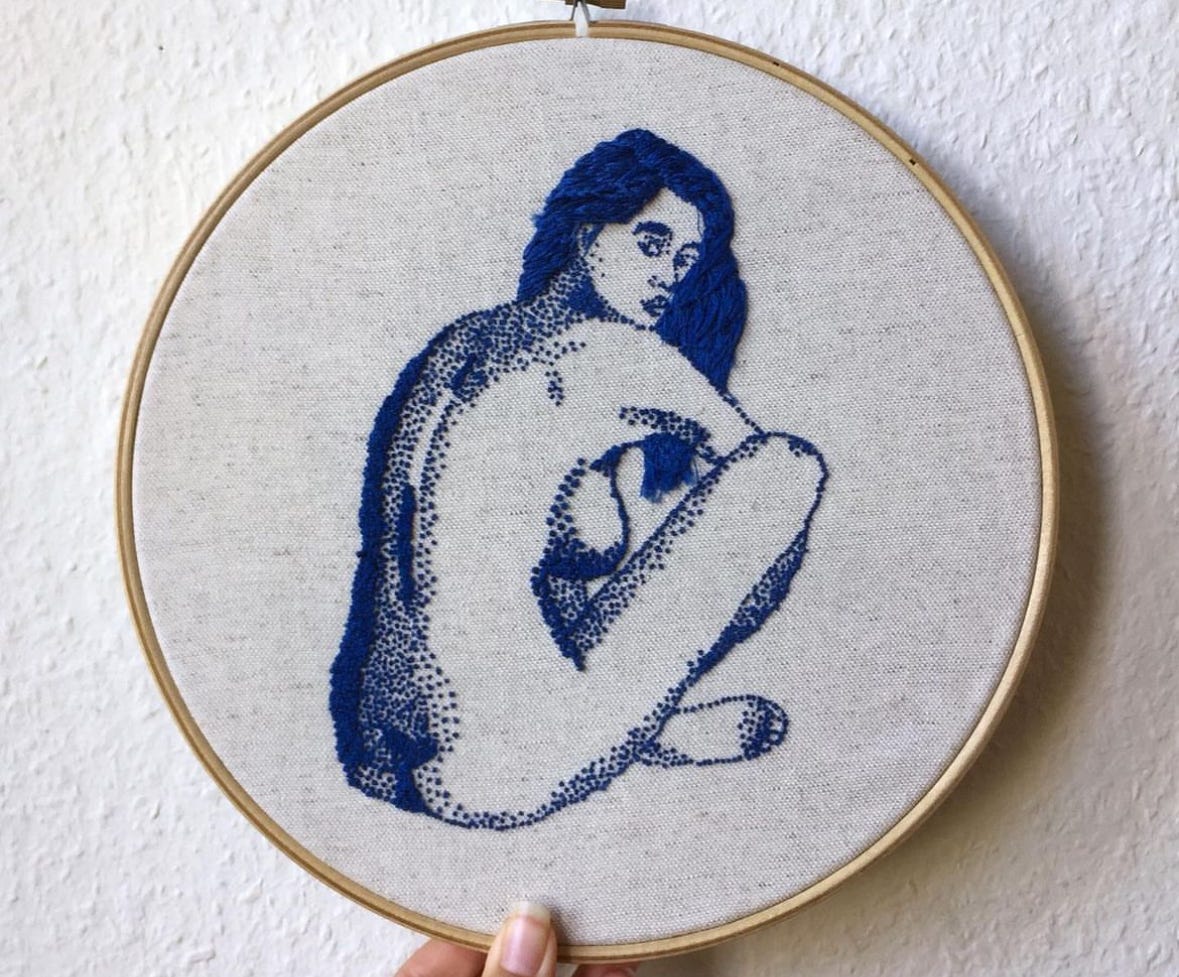What if we all got the idea of wellbeing wrong?
Maybe it’s less about what we do, and more about what we don’t do
Welcome to Follow Your Gut, a newsletter with poignant and reflective writing about the artist life and business from the perspective of a near decade long independent art career (with two young toddlers in tow).
Yesterday I read
’s interview by and my heart skipped a beat.Not for the interview per se, but for one thing Emma said in response to the question about what wellbeing means to her.
She said:
I know that I’m in a good place mentally when I have capacity. Capacity for others, for myself, for a friend in need, for my work. I can respond to a text, or take an unexpected call, or take an impromptu walk
Capacity.
So simple, yet so complicated.
So limited, yet so infinite.
Last year I suffered from post-partum depression and anxiety. I’d be up at night drowning in sweat and a drumming heart as the silence around became increasingly oppressive.
For a period of time I had no capacity to do anything but survive.
There was no option to think about being creative, new ideas, productivity, self care…
Yes, I said it.
Self-care for me became a commercialized concept that often-times involve more doing and less caring. And I simply had no capacity left to do anything but the most basic needs for myself and my family, which is why I often ended the day feeling even more depleted for “not even being able to do self-care”.
But maybe we all got wellbeing wrong?
Maybe, it’s in fact as Emma suggests, a matter of adjusting the tap to make sure the tank never goes empty. To make sure that there’s always capacity left to wake up in the morning.
It’s not about what we do for ourselves, but rather what we allow ourselves to NOT do.
My way of caring for myself, became equaled to LESS. Less of everything, because my capacity was extremely limited.

On the contrary, which is why the word triggered something deep within, I knew I had exited the season of less as soon as I felt I had the capacity to start doing more again. When I felt excited to meet people, go places, ideas for new projects, and ones again an ease to write (yes, this Substack has definitely opened the tap more than I could’ve imagined).
The thing is just that I didn’t realize until yesterday that it was the ebb and flow of CAPACITY that caused my different states of wellbeing. Even more so the recognition of how much was available at various times.
From now on I’ll always keep a mental note to ask myself about my capacity level when facing a decision.
“Do I have capacity to do this right now?”
Some seasons will be full of yes’s others marked by big NOs and both are ok in the name of wellbeing. In fact, both are probably necessary to make up a balanced life.
Thank you for reading!
Elin, xx
Now it’s your turn: I’d love to hear your reflections in the comments - have you heard of the concept of capacity before, or are you as mind-blown as me? How do you define wellbeing?
Ps. Thanks a million to everyone who has responded to the reader survey around Paid newsletters! We collectively reached the goal of 100+ responses. I’ll write together the report as soon as I have the mental capacity to do so ❤️🙏🏼
Pps. This article is another example of “the one thing” that can change your life around.. if you didn’t read my recent essay on it, you’d love it too:
You can also check out the how, why, who and what in the post below:






It is dangerous to ever be running at full capacity ... what if something that requires more of you shows up and must be done?
Computers, hotels, etc. are never running at full capacity, even stuffing the stomach to full capacity is a recipe for indigestion. If one is nearing capacity, the nos should start stacking up.
To exhaust capacity is to live precariously. Whatever we do, there must always be the space to act on something if the need emerged. I'd rather be accused of laziness for having this capacity than risk crushing from being overstretched and overwhelmed.
My friend was given some advice recently as she just became a new mum, which she shared with me and I think is in keeping with capacity.
The idea is that we wake every day and determine how much energy or capacity we have to give. For example, you might wake up and feel utterly rubbish and think "I am only going to be able to achieve the bare minimum today, which requires say, 30%".
You take this into consideration when planning your day, sharing responsibilities with significant others and factoring in necessary daily tasks. It's also important to be open about what capacity you DO have to give with people around you.
Some days you'll have more capacity than others, some days you'll be on a home run, experiencing consecutive days of 80% plus. On those days you might feel able to go for lunch with friends and then pop round your in-laws for an afternoon cuppa, before coming home and cooking a new recipe from scratch. Or you might not. Everyone's capacity percentage is individual to them.
What I took from this little piece of advice was to think about what energy YOU need for YOU, and then what you have "left over" to dish out during the day. Don't be handing out energy recklessly because you might find yourself without the energy needed to complete some of your necessary tasks, and we all know what it feels like to have done very little some days and then feel annoyed at ourselves for not achieving anything throughout the day.
We might be able to cut ourselves some slack and feel more accomplished if we started off those days knowing we only had x% capacity to give to begin with.